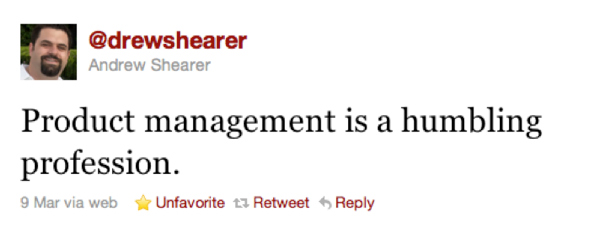I’ve been thinking a lot about the importance of humility in design. About a month ago David Gillis said the following in a great article for UX Magazine:
When it comes to designing experiences, cultivating a humble approach is absolutely essential. The sheer complexity of the design challenges we face demands open-mindedness – a willingness to test and modify assumptions, to make mistakes and be proven wrong.
Humility is about knowing what you don’t know, and when it comes to dynamic, interdependent, multi-platform systems, there are an awful lot of unknowns.
And then there’s this tweet by a good friend that’s been on my mind for a while now:

Ain’t that the truth.
But let’s also clarify: I’m talking about true humility here. Not the “Oh, I’m so humbled by your praise so let me retweet it to all my followers” humility. I’m talking about the humility that comes from realising that Design is about meeting user needs, that it’s a study of human behaviour so if any of us want to call ourselves experts at it we are sorely mistaken.
I didn’t think that a medieval monk could teach us much about design, but I recently stumbled on a quote by Thomas Kempis that brought this whole concept home for me:
A true understanding and humble estimate of oneself is the highest and most valuable of all lessons.
Should you see another person openly doing evil, or carrying out a wicked purpose, [or launch a really bad website,] do not on that account consider yourself better than him, for you cannot tell how long you will remain in a state of grace.
We are all frail; consider none more frail than yourself.
I don’t think this means we should stop being critical when we see bad design. But I do think it means we need to criticise with the aim to contribute to the design community, not break it down. If we learned anything from the Dustin Curtis “Dear American Airlines” story, it’s that we cannot possibly know why people make some of the design decisions they make.
So let’s help each other out, is all I’m saying. Because one day you might put a bad design out there, and all you’ll ask for then is a little advice and lots of grace.